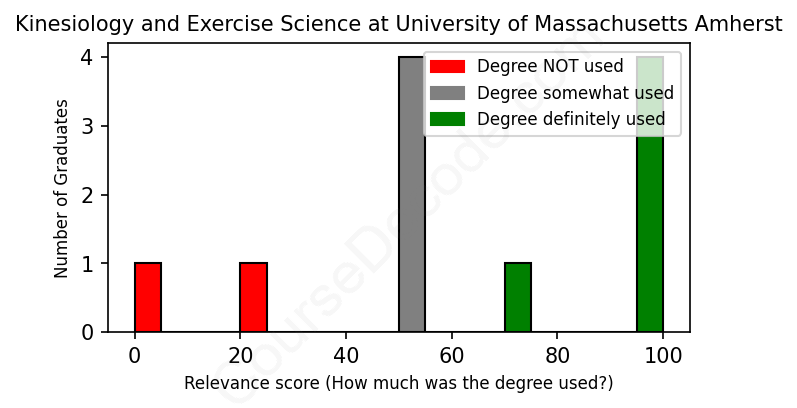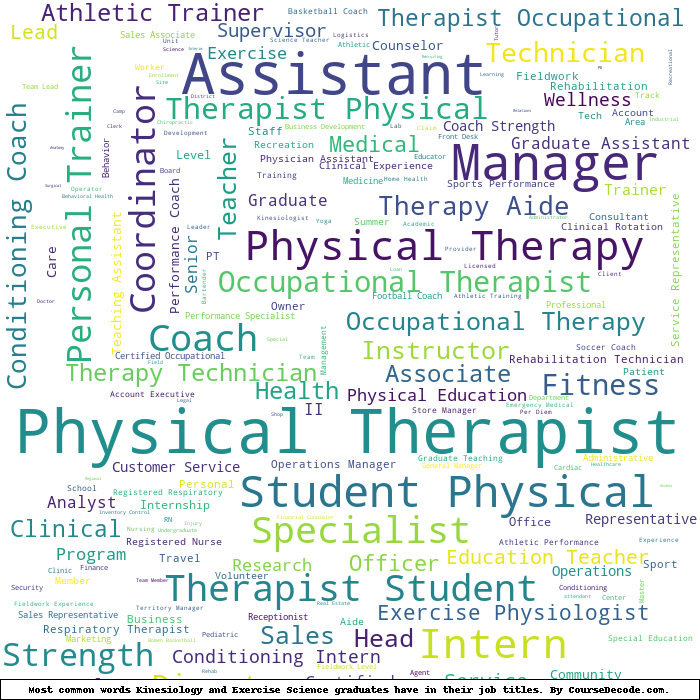
First, some facts. Of the Kinesiology and Exercise Science graduates from University of Massachusetts Amherst we've analyzed , here's how many have used (or NOT used) their degree in their career:

These are estimates based on AI analysis of 11 LinkedIn profiles (see below).
The verdict? Slightly below average. Overall, with an average relevance score of 63%, Kinesiology and Exercise Science graduates from University of Massachusetts Amherst have a slightly lower likelihood (-4%) of finding work in this field compared to the average graduate across all fields:
And for comparison, here's the chart for all profiles we've looked at across all degrees.
Also, after graduating, 54% of these graduates have pursued further education other than another Bachelor's degree (such as a Masters degree or other), compared to the average across all profiles of 35%. This suggests you may need more than just a Bachelors degree to be competitive as a Kinesiology and Exercise Science graduate.
See the details:
|
Relevance score: 50% We think this person has gone into a career only somewhat relevant to their degree. We think this person has gone into a career only somewhat relevant to their degree.
DEGREE INFOGraduated in 2013 from University of Massachusetts Amherst with a Bachelor's degree in Kinesiology and Exercise Science. Also pursued further education since (see below). JOB HISTORY SINCE GRADUATIONRegistered Nurse IntelyCare Feb 2019 - Present FURTHER DEGREES DONE SINCE GRADUATINGAssociate's degreeSignature Healthcare Brockton Hospital School of Nursing 2015 - 2018 ABOUTNo information provided. |
The top 10 most common jobs done by the graduates we've analyzed (ranked most common to least) are:
When looking at the job trajectories of graduates from the University of Massachusetts Amherst with a Kinesiology and Exercise Science degree, it seems there’s a mix of roles that are both relevant and somewhat off-the-mark. A significant portion of those who graduated landed positions that are directly tied to their field, particularly in areas like physical therapy, occupational therapy, and strength and conditioning coaching. These roles, such as Physical Therapist and Assistant Athletic Trainer, require a solid understanding of human movement and exercise principles, reflecting a strong relevance to their studies.
However, there’s also a noticeable trend of graduates stepping into roles that don’t utilize their Kinesiology education at all. Positions like Administrative Assistant or even certain roles in the food service industry have little to do with Kinesiology or exercise science knowledge. This indicates that while many graduates find their way into related careers, a sizable number also venture into other fields where their degree may not be directly applicable. Overall, it appears that while there are solid opportunities in health and exercise-related professions, not every graduate ends up using their degree in a way that’s closely aligned with their training.
Here is a visual representation of the most common words in job titles for Kinesiology and Exercise Science graduates (this is across all Kinesiology and Exercise Science graduates we've analyzed, not just those who went to University of Massachusetts Amherst):

When looking at the career trajectories of graduates from the Kinesiology and Exercise Science program at UMass Amherst, it’s clear that there's a mix of success stories and more deviation from the field. Right after graduation, many tend to find jobs related to healthcare, such as physical therapy aides or administrative roles within health-related organizations. Others opt for jobs that may seem unrelated, like teaching or hospitality, reflecting perhaps a need for immediate income or a change in career direction. Over time, we start to see some graduates transitioning into more significant roles or relevant fields, especially in occupational therapy or physical therapy, which aligns closely with their degree.
By the five to ten-year mark, quite a few of these alumni have managed to solidify their careers within the health sector, becoming occupational therapists or physical therapists, which are super relevant to their studies in kinesiology. However, certain graduates still seem to be in roles that are quite disconnected from their degree, such as positions in administrative support or service industries. This contrast suggests that while some graduates find fulfilling paths directly tied to their studies, others may face challenges breaking into the more specialized aspects of kinesiology and exercise science. So, it’s a bit of a mixed bag—while there are indeed optimistic paths leading to rewarding careers, some don't fully leverage the potential of their degree in the long term.
Honestly, a Bachelor’s degree in Kinesiology and Exercise Science can be pretty challenging, but it really depends on your interests and strengths. If you're into science, anatomy, and staying active, you might find it engaging rather than tough. The coursework involves a fair amount of biology and anatomy, and you’ll definitely have to study hard for things like biomechanics and exercise physiology. That said, a lot of students enjoy the hands-on aspects and the real-world applications of what they’re learning, which can make it more enjoyable. Overall, it’s not the easiest degree out there, but if you're passionate about it, you might find it more fun than a slog!
Most commonly, in the LinkedIn profiles we've looked at, it takes people 4 years to finish a Bachelor degree in Kinesiology and Exercise Science.
Looking at the career paths of these UMass Amherst Kinesiology and Exercise Science grads, it seems like there's a mix of salaries going around. The math teacher from 2011 is probably making a steady salary but not breaking the bank, while the nurse and occupational therapists likely earn decent money, especially as they gain experience. The 2021 grad landing a job with the Boston Red Sox is definitely on the higher end of the scale, but some of the others have more entry-level jobs or part-time gigs that might not pay as well. Overall, it looks like a few are doing pretty well financially, while others are still making their way up the ladder—so it really varies!
Here is a visual representation of the most common words seen in the "about" section of LinkedIn profiles who have a Bachelor degree in Kinesiology and Exercise Science (this is across all Kinesiology and Exercise Science graduates we've analyzed, not just those who went to University of Massachusetts Amherst). This may or may not be useful:

Here are all colleges offering a Bachelor degree in Kinesiology and Exercise Science (ordered by the average relevance score of their Kinesiology and Exercise Science graduates, best to worst) where we have analyzed at least 10 of their graduates: